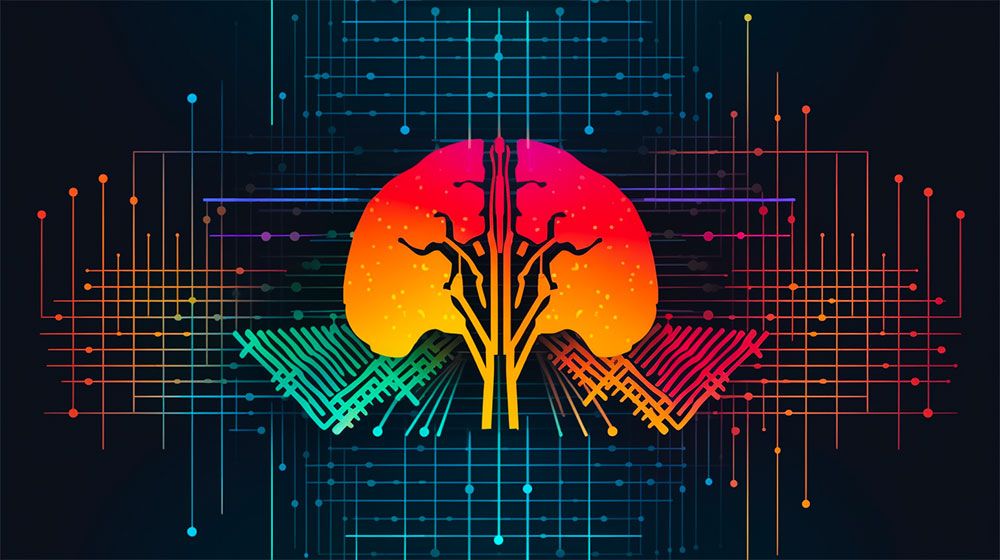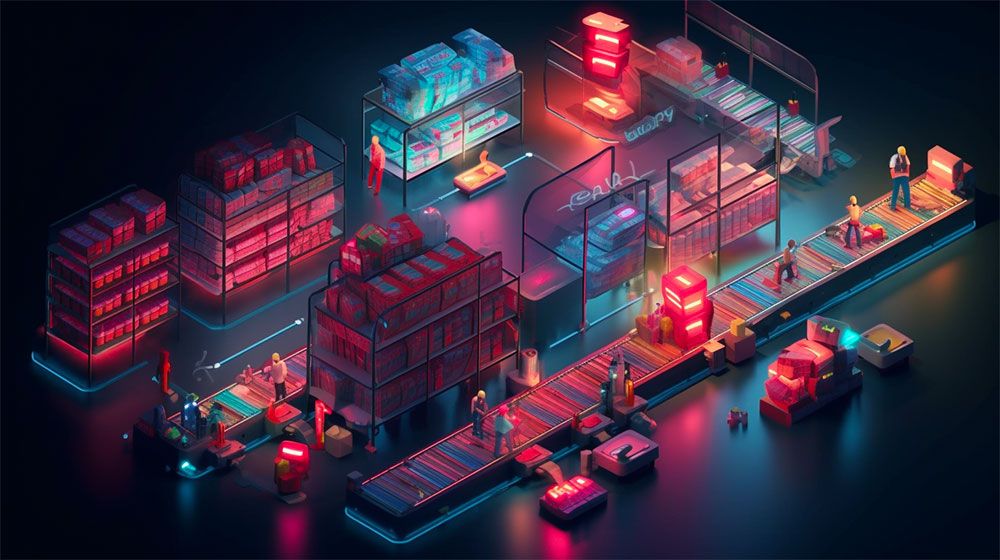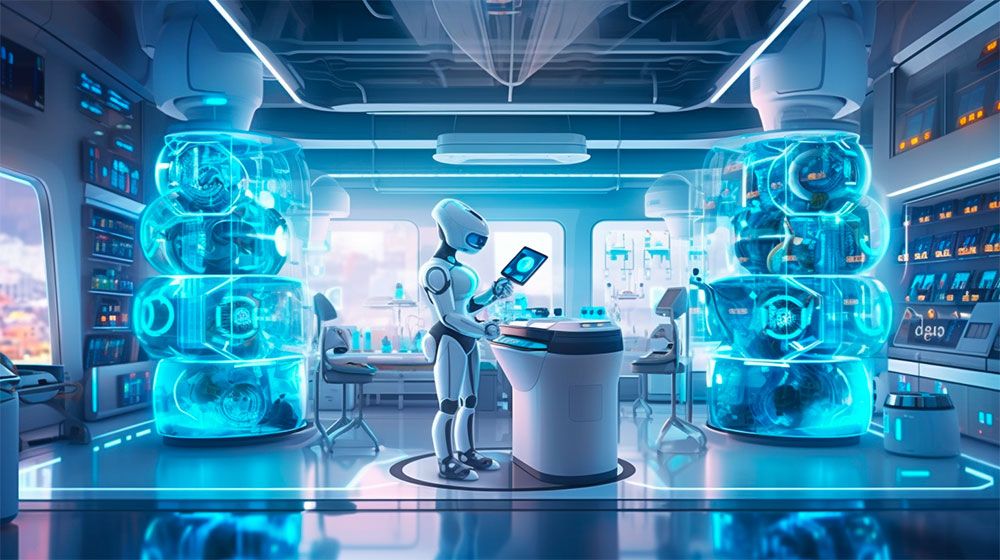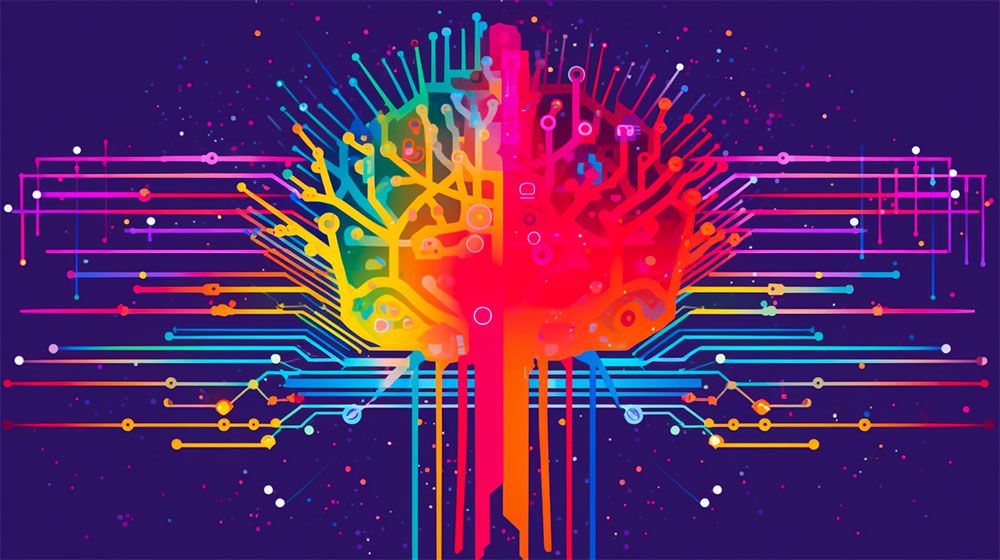How Generative AI Will Disrupt Knowledge Work

In the ever-evolving landscape of technology, one revolutionary concept has captured the imagination of researchers, businesses, and individuals alike: generative artificial intelligence (AI). With its ability to create, simulate, and generate content, generative AI has emerged as a groundbreaking tool that promises to disrupt traditional knowledge work in profound ways. From writing and design to research and analysis, the applications of generative AI are set to transform the very essence of how we approach and engage with information.
In this opportunity, we delve into the exciting world of generative AI and explore how it is poised to revolutionise knowledge work. Gone are the days of laborious research, writer's block, and countless iterations. With generative AI, we are witnessing a paradigm shift in which machine creativity is seamlessly added to human creativity, resulting in previously unheard-of levels of productivity, innovation, and efficiency.
But what is generative AI, and how does it differ from traditional AI? Why is it uniquely suited to transform knowledge work? What are the potential benefits and challenges associated with its integration into various industries? These are the questions I will address as we navigate the potential impact of generative AI on knowledge work and the broader implications for society as a whole.
Join me on this insightful journey as we uncover generative AI's immense potential and disruptive power. From unlocking new avenues of creativity to reshaping our relationship with information, the rise of generative AI is poised to redefine the very nature of knowledge work, enabling us to explore uncharted territories and unlock the full extent of human ingenuity in ways we never thought possible.
The Potential of Generative AI in Knowledge Work
Knowledge work primarily involves using information, expertise, and intellectual abilities to analyse, create, solve problems, and make decisions. It is a type of work that relies on applying knowledge rather than physical labour or repetitive tasks.
In knowledge work, individuals typically use their education, skills, and experience to perform tasks that require critical thinking, problem-solving, analysis, and creativity. This type of work often involves working with complex ideas, data, and concepts, and it can span various fields such as science, research, engineering, design, consulting, writing, programming, and more.
The rise of the digital age and the increasing reliance on information and technology have significantly contributed to the growth of knowledge work. It has become a crucial driver of innovation, economic development, and productivity in modern societies. Until recently, it was always assumed that knowledge workers would not be affected by AI. The rise of ChatGPT and other LLMs completely changed that.
Decision-making and AI
Generative AI will revolutionise knowledge work by offering a wide range of capabilities that can transform how we approach tasks and decision-making processes. With its ability to create, summarise and simulate content, generative AI opens up new horizons for automation, efficiency, and innovation.
Generative AI has the potential to automate various tasks in knowledge work, freeing up valuable time and resources for professionals to focus on higher-level thinking and creative endeavours. A group of researchers from Ochanomizu University and the University of Oxford published a study in February 2023 stating that up to 45% of work tasks could be automated using AI and related technologies, potentially saving $2 trillion in labour costs worldwide.
Generative AI can also significantly influence decision-making processes across various industries. Generative AI models can offer useful insights and predictions to guide strategic decisions by analysing massive amounts of data and simulating scenarios. The McKinsey Global Institute predicts that AI technologies, including generative AI, could contribute an additional $13 trillion to global economic output by 2030.
Scenario Planning and AI
The advantage of generative AI in decision-making is its ability to generate multiple alternative scenarios quickly. This capability allows businesses to explore different possibilities and assess potential outcomes before committing resources. It can enhance risk assessment, optimise resource allocation, and enable more informed decision-making.
Also, generative AI can assist in complex data analysis tasks, reducing the time and effort required to identify patterns, correlations, and trends. It can process vast amounts of data in real-time and present synthesised insights, enabling faster and more accurate decision-making.
Generative AI has the power to revolutionise knowledge work by automating tasks, providing insights, and streamlining decision-making processes. Its potential advantages in efficiency, productivity, and innovation are driving its adoption across industries.
While challenges and ethical considerations need to be addressed, the transformative impact of generative AI on knowledge work is becoming increasingly evident. As we continue to embrace this technology, we are witnessing a convergence of human creativity and AI capabilities that will profoundly shape the future of knowledge work.
Top Industries Positioned for Optimal Benefits from Generative AI in Knowledge Work

Industries across the spectrum continually seek innovative solutions to enhance productivity, creativity, and decision-making in knowledge work. Generative AI, with its ability to analyse vast amounts of data, generate novel insights, and facilitate complex tasks, holds tremendous potential for transformation. From healthcare and finance to big pharma, all industries will benefit from generative AI's application. In this section, we explore some of these industries and highlight how generative AI can empower knowledge workers, drive efficiency, and foster innovation.
Banking and Generative AI

The banking sector is one industry that stands to gain significant advantages from integrating generative AI into knowledge work. With its complex operations, data-driven decision-making, and regulatory requirements, the banking sector can benefit from the automation and efficiency of generative AI.
Risk Assessment and Fraud Detection
Risk assessment and fraud detection are critical tasks in the banking industry. Generative AI can enhance these processes by analysing vast amounts of transactional data and unstructured data, identifying patterns and detecting anomalies with higher precision and speed than traditional methods. Banks can use generative AI models to automate detecting fraudulent activities, minimise losses, and improve security measures.
Compliance and Regulatory Reporting
Compliance with regulations and timely reporting is essential in the banking sector. Generative AI can streamline these processes by automating extracting and analysing relevant (unstructured) data from various sources, ensuring accuracy and compliance. With generative AI, banks can generate comprehensive reports, monitor regulatory changes, and adapt their operations efficiently, reducing the risk of penalties and maintaining compliance standards.
Customer Service and Personalisation
Customer service is a critical aspect of banking, and generative AI can revolutionise how banks interact with their customers. AI-powered chatbots and virtual assistants can use generative AI to understand customer inquiries, provide personalised responses, and even simulate human-like conversations. This automation can improve response times, offer 24/7 support, and enhance the overall customer experience, increasing customer satisfaction and loyalty.
Investment Analysis and Portfolio Management
Generative AI can significantly impact investment analysis and portfolio management in the banking sector. Banks can use generative AI models to analyse massive amounts of financial data, news articles, and market trends to identify investment opportunities, assess risks, and optimise portfolio management strategies. This enables more informed decision-making, better risk management, and potentially higher returns for clients.
With generative AI, the banking industry can unlock increased efficiency, accuracy, and customer experiences. However, it is crucial to consider ethical implications, data privacy, and security measures when implementing generative AI solutions in the banking industry.
Consumer Packaged Goods (CPG) and Generative AI

The consumer packaged goods (CPG) sector is another industry poised to benefit from integrating generative AI into knowledge work. In the CPG industry, knowledge work involves tasks such as market research, product development, supply chain management, and marketing campaigns.
Market Research and Trend Analysis
Generative AI can revolutionise market research and trend analysis in the CPG industry. Generative AI models can identify new consumer preferences, forecast demand patterns, and support the creation of innovative products that align with market trends by analysing consumer data, social media trends, and market indicators. As a result, CPG businesses can stay one step ahead of the competition, offer consumers the products they want, and increase sales.
Product Development and Design
Generative AI can streamline the product development and design process in the CPG industry. Generative AI can help create aesthetically pleasing and useful products by producing design concepts and refining them based on input parameters and customer feedback. This accelerates the product development timeline, reduces costs associated with manual design iterations, and enhances the overall product quality.
Supply Chain Optimisation
Generative AI can optimise supply chain management in the CPG sector by analysing data from various sources, including inventory levels, production capacities, and demand forecasts. With the help of generative AI, supply chains can be made more efficient overall by optimising inventory levels, cutting waste, lowering transportation costs, and simulating various scenarios.
Marketing Campaigns and Content Creation
Generative AI can play a significant role in marketing campaigns and content creation for CPG companies. With the help of generative AI, marketers can automatically produce personalised marketing content, social media posts, and advertisements. This enables CPG companies to deliver targeted and engaging content to their audience, enhance brand visibility, and drive customer engagement.
In the CPG sector, generative AI offers benefits such as improved market insights, accelerated product development, enhanced supply chain efficiency, and personalised marketing campaigns. Using the potential of generative AI, CPG companies can gain a competitive edge, deliver goods that are in line with consumer preferences, and promote business expansion in a market that is changing quickly.
Pharma and Generative AI

The pharmaceutical industry is another sector where generative AI has immense potential to disrupt and improve knowledge work. In the pharmaceutical sector, knowledge work involves extensive research and development, clinical trials, regulatory compliance, and drug discovery.
Research and Drug Discovery
Pharmaceutical research and drug discovery involve complex processes, massive datasets, and time-consuming experiments. Generative AI can assist in accelerating this process by analysing vast amounts of scientific literature, clinical trial data, and molecular structures. It can generate hypotheses, simulate drug interactions, and provide insights into potential drug candidates, thereby expediting the discovery of novel treatments and reducing development costs.
Clinical Trials and Patient Data Analysis
Clinical trials are crucial to pharmaceutical knowledge work, but they often face challenges such as recruitment, data analysis, and adverse event monitoring. Generative AI can aid in recruiting suitable participants by leveraging patient data and medical records to identify potential candidates who meet specific criteria. It can also analyse large-scale clinical trial data, detect patterns, and generate insights to enhance trial design and optimise treatment strategies.
Regulatory Compliance and Drug Safety
The pharmaceutical industry is highly regulated, and compliance with rigorous safety standards is essential. Generative AI can streamline the regulatory compliance process by automating the analysis of complex regulatory guidelines, monitoring adverse drug events, and predicting potential safety issues. Pharmaceutical companies can use generative AI to ensure compliance with regulations, improve patient safety, and speed up the approval process for new drugs.
Personalised Medicine and Treatment Optimisation
Generative AI has the potential to revolutionise personalised medicine and treatment optimisation in the pharmaceutical industry. Generative AI can help better tailor treatments to specific patients by examining patient data, genetic data, and clinical records. It can generate personalised treatment plans, predict drug responses, and optimise dosage regimens, leading to more effective and targeted therapies.
Studies have highlighted the significant impact of generative AI in the pharmaceutical sector. According to a report by Accenture, AI-driven technologies could save the pharmaceutical industry approximately $150 billion annually by 2026 through improved operational efficiencies, reduced development costs, and accelerated drug discovery timelines.
Integrating generative AI in pharmaceutical knowledge work presents opportunities for improved research and drug discovery, streamlined clinical trials, enhanced regulatory compliance, and personalised medicine. The pharmaceutical sector can promote innovation, enhance patient outcomes, and advance medical science by leveraging the power of generative AI.
As generative AI advances, its potential to transform knowledge work in the banking, CPG, and pharmaceutical sectors becomes increasingly evident. In the constantly changing world of knowledge work, industries can achieve new levels of productivity, efficiency, and success by embracing this technology and overcoming related challenges.
Implications and Challenges of Generative AI in Knowledge Work

The integration of generative AI in knowledge work has the potential to reshape job roles and the workforce. While it brings automation and efficiency to various tasks, it also raises concerns about job displacement and the need for upskilling and reskilling. Adopting AI and automation technologies in medium and large businesses worldwide may result in a net loss of over 85 million jobs by 2025.
However, it is important to note that while generative AI can automate certain tasks, it also creates new job roles and responsibilities opportunities. Instead of replacing human workers, generative AI systems can augment their capabilities, allowing professionals to focus on higher-level cognitive tasks, creativity, and strategic decision-making. Organisations need to invest in retraining and upskilling programs to ensure a smooth transition for the workforce and harness the full potential of generative AI.
Generative AI systems learn from vast amounts of data, which can lead to ethical considerations and potential biases. If the training data used is biased or incomplete, the generated outputs may reflect those biases, perpetuating societal inequalities. For example, if generative AI is used to generate resumes or evaluate job candidates, biased training data can result in discriminatory outcomes.
Ensuring diverse and representative training datasets and implementing robust evaluation processes are crucial to address these challenges. Regular audits and transparency in the training algorithms and datasets can help identify and mitigate potential biases. Ethical guidelines and standards should govern the responsible use of generative AI in knowledge work, promoting fairness, accountability, and transparency.
While generative AI systems show remarkable capabilities, it is essential to maintain human oversight and collaboration. Humans possess critical thinking, ethical judgment, and contextual understanding that AI systems may lack. Human experts can provide validation, interpret generated outputs, and make informed decisions based on a broader perspective.
Collaboration between humans and AI systems can lead to better outcomes in knowledge work. Human experts can fine-tune generative AI models, provide feedback, and ensure the generated content aligns with ethical guidelines and organisational objectives. The synergy between human expertise and AI capabilities can result in more innovative and valuable solutions.
Roadmap for Responsible Implementation of Generative AI for Knowledge Workers

Getting started with generative AI for knowledge workers in a responsible manner requires careful consideration and adherence to ethical guidelines. Here is a brief section on how companies can embark on this journey responsibly:
1. Understand the Technology: Before integrating generative AI into your operations, it is vital to have a comprehensive understanding of how the technology works, its limitations, and potential ethical concerns. Educate yourself and your team about the algorithms, datasets, biases, and potential risks associated with generative AI.
2. Define Clear Objectives and Values: Establish clear objectives for implementing generative AI and align them with your company's values. Consider how the technology can enhance your processes, products, or services while adhering to ethical principles such as fairness, transparency, and accountability.
3. Ethical Framework and Policies: Develop an ethical framework or policy specific to generative AI that outlines the responsible use of the technology. Consider aspects like data privacy, security, consent, bias mitigation, and the potential impact on individuals or communities. Ensure that these policies are communicated and followed by all stakeholders involved.
4. Diverse and Representative Data: Generative AI systems learn from data, and biased or unrepresentative datasets can perpetuate inequalities or produce unethical outcomes. Ensure that your training data is diverse, representative, and free from bias. Regularly evaluate and update datasets to prevent unintended consequences.
5. Regular Auditing and Testing: Continuously monitor and audit your generative AI systems to identify and mitigate biases, errors, or unintended consequences. Establish robust testing procedures to ensure that the technology operates as intended and aligns with your ethical guidelines.
6. User Feedback and Consent: Obtain informed consent from individuals whose data or creations are used in generative AI systems. Provide clear information about how their data will be used and seek feedback to improve the system's fairness, usability, and user experience.
7. Human Oversight and Decision-Making: Maintain human oversight throughout the generative AI process. Human judgment is essential to evaluate and interpret the outputs, especially in critical or sensitive areas. Avoid complete automation and ensure that decisions are ultimately made by humans.
8. Collaborate with Experts: Engage with experts in AI ethics, legal compliance, and responsible innovation to gain insights and guidance. Foster collaborations with diverse stakeholders, including ethicists, social scientists, and impacted communities, to address complex ethical challenges.
9. Transparent Communication: Communicate openly and transparently about your company's use of generative AI. Provide clear explanations of the technology, its purpose, and its limitations to build trust among stakeholders, including employees, customers, and the public.
Through these responsible practices, companies can harness the potential of generative AI while minimising ethical risks and ensuring the technology benefits individuals and society as a whole.
Final Thoughts

As we delve into the realm of generative AI and its impact on knowledge work, we stand on the verge of a transformative era. The integration of generative AI brings many opportunities, such as increased productivity, streamlined processes, and groundbreaking solutions. However, it is crucial to approach this technological advancement with a human-centric mindset, embracing the possibilities it offers while navigating the associated challenges.
While generative AI can automate various tasks, it is important to acknowledge that it cannot replicate the unique qualities of human intellect, empathy, and creativity. Human professionals play an indispensable role in knowledge work, bringing critical thinking, ethical judgment, and contextual understanding to the forefront. We can combine the benefits of technology and people by working with generative AI systems, forging a seamless union that inspires us to achieve extraordinary feats.
Addressing ethical considerations and biases is also paramount as generative AI becomes integral to knowledge work. The learning process of generative AI heavily relies on vast datasets, which can introduce biases if not handled with care. To mitigate these challenges, it is vital to ensure the utilisation of diverse and representative datasets and establish ethical guidelines. Potential biases can be found and corrected with the help of regular audits and transparency in training algorithms and datasets. We can build trust in generative AI and take advantage of its potential for societal benefit by encouraging fairness, inclusivity, and accountability.
Together, we embark on a journey where generative AI becomes a catalyst for human progress, forever transforming how we work, think, and create. The possibilities are abundant, and the decision to embrace generative AI and its limitless potential lies within our grasp. Let us seize this opportunity to shape a future where knowledge work knows no bounds and where the symbiotic relationship between humans and AI leads us to uncharted realms of success.





